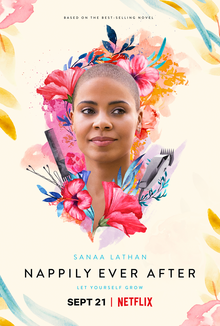Difference between revisions of "Nappily Ever After (2018)"
Skalexsong (talk | contribs) (Created page with "Nappily Ever After is a 2018 American romantic comedy film directed by Haifaa al-Mansour and written by Adam Brooks and Cee Marcellus. It is based on the novel of the same nam...") |
|||
| (2 intermediate revisions by 2 users not shown) | |||
| Line 1: | Line 1: | ||
| − | Nappily Ever After is | + | '''Nappily Ever After''' (2018) is an American romantic comedy movies directed by Haifaa al-Mansour. The movie is inspired by a novel of the same name by Trisha R. Thomas.<ref>https://en.wikipedia.org/wiki/Nappily_Ever_After</ref>[[File:Nappily Ever After.png|thumb|Nappily Ever After]] |
| + | ==Plot== | ||
| + | Violet Jones doesn't understand it from the start however she's overwhelmed by her shallow, "awesome" life. She has all she thought she'd require - an effective vocation, companions and a sweetheart who is a doctor (Whittle). At the point when her fantasy starts to unwind, so does she. This film shows what a wonderful, shrewd, fruitful lady can do when she begins to search internally rather than outward.<ref name=":0">https://www.imdb.com/title/tt0365545/</ref> | ||
| − | == | + | ==Controversy== |
| + | This movie is all about a black woman's hair and how their life is in a world full of stigma out of their hair. Black women are seen wild, uncultured, messy, and unprofessional if they do not straighten their hair.<ref name=":0" /> | ||
| − | + | Netflix goes into a lot bigger discussion in world history through this film, holding up a mirror to oppressive Eurocentric magnificence standards as they identify with individuals of color and their hair.<ref>https://sojo.net/articles/nappily-ever-after-about-more-hair</ref> | |
| − | + | The situations major theme in the film, that what Black women do with their hair is somehow only valid if men deem it so. It has nothing to do with the Black ladies themselves and all to do with their allure. The movies also spends a larger part of its time lecturing the goodness of going natural, however it does this by subverting Black ladies who are not normal, imagining them as substandard somehow or another.<ref>https://wearyourvoicemag.com/way-nappily-ever-attempts-celebrate-black-hair-actually-harmful/</ref> | |
| − | [[Category:Black Racism in Comedy Movies]] | + | ==Reference== |
| + | |||
| + | [[Category:Black-Targeted Racism in Comedy Movies]] | ||
| + | <references /> | ||
Latest revision as of 06:11, 15 March 2021
Nappily Ever After (2018) is an American romantic comedy movies directed by Haifaa al-Mansour. The movie is inspired by a novel of the same name by Trisha R. Thomas.[1]
Plot
Violet Jones doesn't understand it from the start however she's overwhelmed by her shallow, "awesome" life. She has all she thought she'd require - an effective vocation, companions and a sweetheart who is a doctor (Whittle). At the point when her fantasy starts to unwind, so does she. This film shows what a wonderful, shrewd, fruitful lady can do when she begins to search internally rather than outward.[2]
Controversy
This movie is all about a black woman's hair and how their life is in a world full of stigma out of their hair. Black women are seen wild, uncultured, messy, and unprofessional if they do not straighten their hair.[2]
Netflix goes into a lot bigger discussion in world history through this film, holding up a mirror to oppressive Eurocentric magnificence standards as they identify with individuals of color and their hair.[3]
The situations major theme in the film, that what Black women do with their hair is somehow only valid if men deem it so. It has nothing to do with the Black ladies themselves and all to do with their allure. The movies also spends a larger part of its time lecturing the goodness of going natural, however it does this by subverting Black ladies who are not normal, imagining them as substandard somehow or another.[4]
